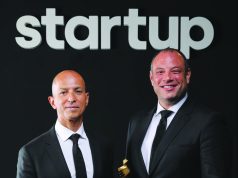There’s scarcely a day when a new scientific breakthrough doesn’t hit our news feed as some of the brightest minds around the globe dig deeper into the marvels of our universe.
One of these is young wife, mother, and award-winning molecular biologist, Dr. Menatallah Elserafy, who tirelessly explores the world of genomes, the genetic chromosomes present in the cell. How, we wondered, does she find a balance between her work as an assistant professor and researcher, and family life?
How did you become fascinated by the world of science and research?
As a child, I was actually much more attracted to languages, where I did well. Back then, science classes were traditional and not as advanced as today, they didn’t hold any appeal for me. It wasn’t until high school biology and chemistry classes that I started to enjoy science. The instructors explained the subject matter well, biology in particular, and my fear of science disappeared.
I went on in my studies to join the Faculty of Pharmacy at the German University of Cairo, but switched to biotechnology after two years, realizing that biotechnology was the future of medicine. I enjoyed it so much that I realized I would benefit from an international environment, so I traveled to Germany to pursue my master’s degree in the field.
I actually left for Heidelberg University, one of the most prestigious in Europe and a leader in biological sciences studies, on the day I received my bachelor’s degree. When I completed my doctorate in 2015, I was not yet 26 years old, and I decided to return to Egypt, where my contribution could be greater.
Who have been your biggest supporters so far in your career?
My mother encouraged me to study biotechnology and genetics, as she believed that very soon our health and use of medicine would be tailored to our genetic makeup, not just delivered according to symptoms, as standard prescriptions. And my father and my husband, of course.
Has there been another person who served as an inspiration?
I was really inspired by Prof. Dr. Ahmed Zewail. He was awarded his Nobel Prize when I was in primary school, and my mother took me to attend his first public speech. Even though I was not really interested in science, I saw how a person could rise from rather humble beginnings to make such a difference for humanity.
Even at that age, it impressed me. From then on, growing up, I always wanted to have a job where I could make a difference.
What can you tell us about your field of research?
The first step towards treating any disease is to understand the genetic defects behind it. Deciphering gene function is crucial for understanding molecular mechanisms and diseases.
My current research is to utilize yeast to understand molecular mechanisms in the cell. When you understand how something works, you can understand when it is disrupted or when it malfunctions, what is wrong, and how to treat it. We work with both yeast and human cells. The yeast research, in particular, has led to several important discoveries due to its ease of manipulation that have led to Nobel prizes.
We also employ bioinformatic approaches to analyze genetic defects in patients and to strengthen our findings by linking them to real patients. Our research can be applied to cancer and neuro-degenerative disorders: by gaining a better understanding of the genetic profiles we add to our understanding of the reasons behind the disease.
So, how do you manage to juggle your work and personal life?
My son is just one year and ten months old, and motherhood is a massive responsibility. I took three months maternity leave and even worked through a lot of that. I am also finishing a diploma in bioinformatics. I am also a member of Global Young Academy and a co-lead for the Women in Science Working Group.
I am a member of Next Einstein Forum and the Egyptian Young Academy of Sciences, and I’m currently working with over ten bachelor and master degree students as well as collaborating with other groups. The future of each student is in many ways my responsibility, so I need to follow up continuously.
I also apply for grants to finance the immense amount of research we do. On top of that I have also taken several courses in intellectual property rights, both abroad and in Egypt, which have been very helpful. I am naturally very energetic, if my schedule isn’t full, I can get depressed!
So, it has been difficult at times to find the right mix between work and family life. It seems that the appropriate balance never comes. I am fortunate to have a good babysitter who takes care of my son during working hours, and now he will be starting nursery school.
My husband is a great help and support with our domestic life and our child. We both see it as an essential part of marriage to share the upbringing of our son, as a child also needs to bond and develop closeness with his father through play and shared time together. And of course, my mum is always there to help when the need arises.
What advice would you give to any girl choosing a demanding career?
Do what you think is right for you, and listen to different points of view before taking the decision that feels best. Don’t be swayed by people who try to tell you that a girl who has a challenging career will not be accepted by a husband, or that a girl who travels abroad will not marry, or that if you have a successful career you will have a miserable home. This is nonsense, and no girl should listen to this, to be honest.
People can meet their future partner anywhere. You must select your partner very carefully, as it is not just about getting married, it is a collaborative union. Each person has unique skills and talents, so find the person who can support you in developing those qualities.
Don’t seek perfection in all areas of your life at the same time, there may be career high points and home life may sometimes suffer, but don’t beat yourself up so long as your intentions are good.
What have been the most rewarding moments in your career?
I think the standout moment must have been the award at the L’Oréal-UNESCO for Women in Science Fellowship in 2017. It was a big milestone for me. Also, when I took the International Rising Talents award in 2019.

I learned a lot from being a L’Oréal-UNESCO Fellow, in networking, interacting with the media etc. Since then, I have fortunately had a chance to collaborate with two of the other International Rising Talents that I met in Paris.
Quickfire Round:
Hobbies or sports? I have always been a bookworm and love reading, but now with a small child, it is hard to find time to finish anything I start. My hobbies are very simple; I like walking, cycling, shopping, and meeting up with friends. Or finding a place where I can sit in silence with a coffee, to relax. I also like cooking, but only when I am in the mood.
Early riser or night owl? I am a real night owl, which is not easy when you a have a small child, and my husband is an early bird. I tend to work very late into the night and get quality work done while everyone else is asleep.
Last book read? A rather sad book on the life of Sudanese refugees in Egypt. It really touched me and made me realize how important it is to work towards creating a better life for people we host as a country.
Holiday destination? Anywhere where I can do some great shopping and experience a new culture and cuisine. I love places with traditional markets. Heidelberg is still very special for me, I would love to go back and catch up with people. I love Paris as well.
Habit you would like to break? I wish I could sleep earlier and wake up earlier. Also not to have such high expectations of people, and feel bad if they let me down.
Person whose advice you always listen to? I listen to my mum, and my friend Yomna who is a psychologist. She is a peaceful, non-judgmental person who helps me think and find clarity.
Best quality in a friend? To be able to keep a secret, no matter what happens in life. To be there for you when times get tough, and trust in your intentions and forgive mistakes.
Epigenetics Explained: How Lifestyle Can Change Your Genetic Labels








